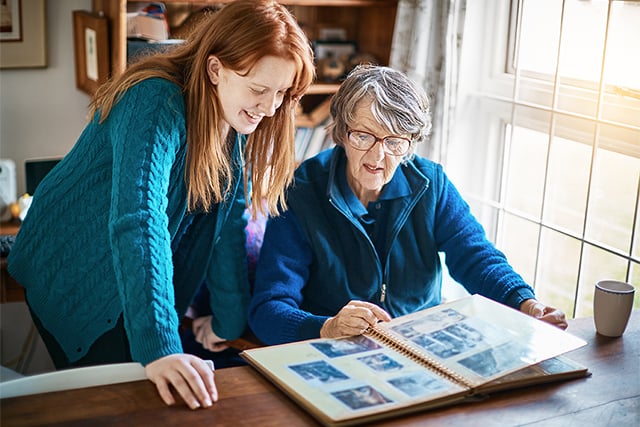
For many people, it's very important to learn as much as possible about past generations. In fact, an MIT Technology Review reported earlier in 2019 that over 26 million people have taken an at-home ancestry (DNA) test.
Yet how many of us are as interested – or proactive – in preserving the memories and histories of those family members who are still with us?
Preserving family history and stories is important in so many ways because it connects us more closely to our family members, it helps us understand each other better, and it’s a way to validate our loved ones’ lives. Furthermore, research has found that sharing life stories can “lead to higher mental stimulation, improved memory, deeper social connections and increased activeness in older adults,” according to Guideposts.org.
That’s why many communities managed by The Goodman Group offer opportunities that encourage and support residents to document and tell their life stories. “This is My Life” is a Life Enrichment initiative that invites residents to tell their personal life stories to an audience of fellow residents, family and friends, and staff.
These presentations have become so popular among the residents that the rooms are often packed with attendees. Other residents are eager to learn more about their neighbors and often encourage them to tell their own stories. It’s been a wonderful way for residents to strengthen their community and friendships.
Families can make similar connections, too, by starting an family history questionnaire. It’s easy to get started with these five steps:
- Schedule a convenient time to meet with your loved one in a quiet environment where you won’t be disturbed. Set aside at least an hour to start.
- Bring a tape recorder, a notebook, or even a video camera to record your conversation (with permission from your family member).
- Have a general plan of topics to discuss. One effective approach is to divide your conversation into life stages: childhood, teens and early adulthood, later years, and so on. Another is to focus on topics like work-life, raising a family, hobbies, and retirement.
- Be prepared to be flexible. Stories sometimes come out in their own way and time. If your conversation “goes off track,” just follow it along – you may end up with some real gems.
- Most histories won’t get covered in a single session. Ask your loved one what they’d like to talk about next and schedule your next conversation.
 These are just the very broad strokes of how to get started with a family history questionnaire. You can find more tips and tricks at UCLA Library’s Conducting Oral Histories with Family Members.
These are just the very broad strokes of how to get started with a family history questionnaire. You can find more tips and tricks at UCLA Library’s Conducting Oral Histories with Family Members.
There are great benefits and rewards of starting a family history questionnaire. They include “deeper conversations with loved ones, greater understanding about where we come from, a changed perspective about what’s important in life, strengthened ties between generations, and profound feelings of gratitude,” according to FamilySearch.

